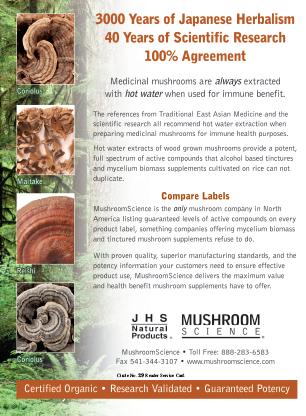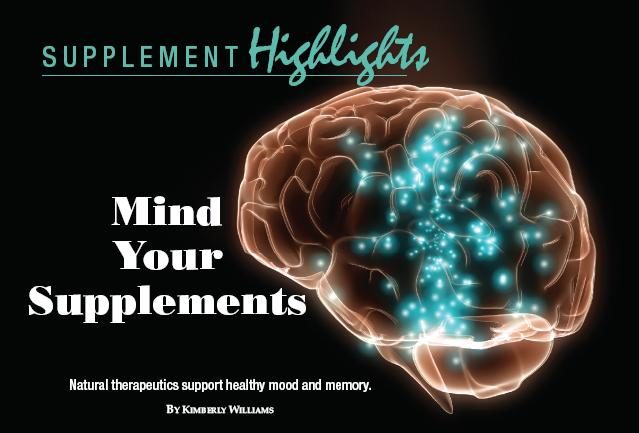Just as it is important to keep gas in our vehicles and schedule routine check-ups to extend the lives of our cars, it is also essential to stay in tune with our mental well-being. Keeping a positive mental outlook and maintaining one’s mental acuity may seem effortless to some, but it is difficult for the millions of people who suffer from mood and memory disorders. Read further to learn how you can help customers address mood and memory from a nutritional standpoint.
Feeling Down in the Dumps
Before we delve into appropriate supplements for mood disorders, it’s vital to understand the disorders themselves. There are many forms of depression, each taking an emotional toll on countless U.S. families.
Pregnant women may be prone to postpartum mood disorders, prolonged periods of sadness occurring in the first year after giving birth (1). Postpartum mood disorders are divided into three categories: baby blues, puerperal psychosis and postpartum depression.
 Surely everyone experiences occasional lows in life. But with clinical depression, the most common form of depression, symptoms can last for days and sometimes weeks or months on end (2). Symptoms can include stress, memory loss, unexplained exhaustion, suicidal feelings, excessive hunger or weight gain, and loss of interest in day-to-day activities, among others (2).
Surely everyone experiences occasional lows in life. But with clinical depression, the most common form of depression, symptoms can last for days and sometimes weeks or months on end (2). Symptoms can include stress, memory loss, unexplained exhaustion, suicidal feelings, excessive hunger or weight gain, and loss of interest in day-to-day activities, among others (2).
Seasonal affective disorder is attributed to inadequate exposure to sunlight on a regular basis. When the body is exposed to little sunlight (such as during the winter months), melatonin builds up and creates an imbalance of the neurotransmitters serotonin and dopamine. Abundant amounts of melatonin in the body can create feelings of weariness, fatigue, anxiety, sadness and the inability to focus (1). For relief of seasonal affective disorder, a doctor may suggest using light therapy or high-intensity lights.
Natural Pick-Me-Ups
There is a direct link between nutrition and mood. In fact, the foods we choose greatly affect the levels of brain chemicals needed to regulate one’s mood (3). In one study, researchers concluded that 80% of people who experience mood disorders were aware that the foods they ate affected their feelings and mood (3). Case in point, sugary foods and alcohol go hand in hand with a dip in mood. They also can contribute to anxiety disorders, fatigue and mental fuzziness, anger disorders, impulsive and distractible disorders and depression-related disorders (3). On the other side of the spectrum, fish, vegetables and fruit are connected to happier moods and feelings.
Individuals who are experiencing depression or mood disorders should take a look at whether their diets may be a factor in their conditions. Then if additional support is needed, several supplements offer natural pick-me-ups.
St. John’s Wort (Hypericum perforatum) is believed to be a mood elevator. Studies have proven that hyperforin is the main anti-depressive agent in this herb. Mounting evidence suggests that St. John’s Wort impedes the rate tha t the brain reabsorbs serotonin, therefore leaving more neurotransmitters for reception. The British Medical Journal published a study of 23 clinical trials to gauge whether St. John’s Wort could improve depression. The study pitted St. John’s Wort against a placebo, and analyzed studies that compared the herb to regular antidepressants. The results concluded that participants suffering from mild to moderate depression saw improvements with St. John’s Wort (63.9%), compared to those who took traditional antidepressants (58.5%) (1). And, experts say there may be other benefits to using this herb: because it’s a natural antidepressant it may have far fewer side effects than synthetic antidepressants (1).
t the brain reabsorbs serotonin, therefore leaving more neurotransmitters for reception. The British Medical Journal published a study of 23 clinical trials to gauge whether St. John’s Wort could improve depression. The study pitted St. John’s Wort against a placebo, and analyzed studies that compared the herb to regular antidepressants. The results concluded that participants suffering from mild to moderate depression saw improvements with St. John’s Wort (63.9%), compared to those who took traditional antidepressants (58.5%) (1). And, experts say there may be other benefits to using this herb: because it’s a natural antidepressant it may have far fewer side effects than synthetic antidepressants (1).
SAMe (S-adenosyl-L-methionine) is a naturally occurring substance that is formed by mixing the amino acid L-methionine with ATP (adenosine triphosphate), which is used in many processes in the body (1). SAMe also plays a crucial part in the formation of mood-controlling neurotransmitters in the brain; because of this, it is thought to be effective at easing depression-related symptoms. Overall, clinical trials have indicated that SAMe promotes a healthy balance of brain cell functions.
Kava (Piper methysticum) is an herb that contains fiber, starch, sugar, proteins and minerals, as well as kavalactones in its roots. According to nutrition experts, “Clinical studies have shown that a combination of all of these elements can clear the area around brain receptors for gamma and amino butyic acid (GABA)” (1). GABA produces binding sites for neural receptors, which allows relaxed muscles and relief from anxiety and pain. Kavalactones also affect the part of the brain called the amygdala, which is responsible for controlling body functions such as emotional levels, blood pressure, heart rate, appetite and body temperature, to name a few (1). Kava also may relieve depression-related symptoms, namely, loss of libido, pain and irritability.
Tryptophan can convert into 5-HTP (5-hydroxytryptophan), which then can convert into the neurotransmitter serotonin. This chemical may help induce a feeling of calmness (among other things) (1). It is thought that 5-HTP may help those experiencing depression because of this connection.

The basic vitamins also are said to maintain healthy brain function. Taking vitamin B2 (riboflavin) is an essential part of maintaining proper brain cell function. It also is said to aid in the metabolism of essential fatty acids and quench free radicals in the body. On another note, vitamin C is paramount for making and preserving norephinephrine and serotonin. It is also believed to be beneficial for the stimulation of adrenal glands (3).
And, multivitamins may help “reverse moodiness, irritability, impatience, anger and depression. Multivitamins are a good all-round mood and mind enhancer” (3).
Dulling Memory
As we age, mental acuity can become duller than it once was. While this is natural, some individuals experience more severe memory-related disorders such as dementia and Alzheimer’s disease (AD). AD, the most common form of dementia, is the continual depletion of nerve cells in certain areas of the brain, which results in acute memory loss, forgetfulness, and the ability to function on one’s own (4). Dementia is a general term for the loss of memory and other intellectual abilities, which affects everyday lifestyles.
This hot button topic remains on the minds of researchers, as they are not sure exactly how or why the disease occurs. But, they do know that nearly 5.3 million people in the United States are living with AD and every 70 seconds, someone else is diagnosed with the disease. AD is the seventh-leading cause of death in the United States. Surprisingly, AD also accounts for 50–70% of dementia cases.
|
Antidepressants and Teens Many forms of prescription medication on the market vow to deliver relief from |
The fact of the matter is that AD cannot be cured. But, vast research indicates there are benefits to using natural therapeutics for AD.
One such supplement is Lion’s mane (Hericum erinaceus). This mushroom may inhibit brain dysfunction associated with Alzheimer’s and other neurological diseases. It is thought to increase cognitive abilities and improve muscle and motor pathways to response.
Studies have provided evidence that the components found in Lion’s Mane (erinacines and hericenones) stimulate the nerve growth factor (NGF) in neurons. In a recent Japanese study, 50 dementia patients were given five grams of lion’s mane per day for six months. The results yielded significant changes: cognitive function improved in most patients (5, 6).
The omega-3 DHA also plays a crucial role in normal brain function. On the AD front, a 2007 small animal study indicated that DHA may slow the accumulation of a protein that leads to the signature brain lesions in those with AD. And, it offered evidence that DHA reduces beta amyloid levels. This protein can form plaque in the brain, another factor in AD. Some feel that these are the reasons why DHA may delay the onset of AD (7).
In terms of overall memory support, ginseng (Panex ginseng) is said to be particularly good for its link to stress management (1). “High levels of the stress hormone cortisol interfere with memory and the production of new brain cells. Ginseng supplements can buffer some of that stress, at least temporarily” (1). Researchers in Britain tested whether combined extracts of ginkgo and ginseng would improve memory in active middle-aged men and women. Partakers were either given 60 mg of ginkgo extract and 100 mg of a standardized ginseng extract twice a day, 120 mg of ginkgo and 200 mg of ginseng daily or a placebo. It was reported in the Journal of
Psychopharmacology that those who took the herbs remembered more information as opposed to those who took a placebo.
Vitamin E also has been the subject of some memory research. One in-depth federally funded study showed that vitamin E slightly delayed the loss of the ability to carry out daily activities, therefore decreasing the chances of placement in residential care. “Scientists think vitamin E may help because it is an antioxidant, a substance that may protect nerve cells from certain kinds of chemical wear and tear ”(6).
And, phosphatidylserine is said to support memory recall by accelerating neural signal transmission via cell membrane permeability. Ginkgo biloba may be useful for supporting short-term memory, improving signs of dementia and offering overall mental clarity and focus. French maritime pine bark extract (Pycnogenol) also may support healthy memory functions. Also, keep the B-vitamins in mind for memory support, as B12 deficiency is often found in those with cognitive decline (8). WF
References
1. L. Knittel and J. Challem, User’s Guide to Natural Remedies for Depression (Basic Health Publications, North Bergen, NJ, 2003).
2. Psych Central, “Depression (Major Depressive Disorder),” http://psychcentral.com/disorders/sx22.htm, accessed Aug. 19, 2009.
3. J. Challem, The Food-Mood Solution (John Wiley and Sons, Hoboken, NJ, 2007).
4. A Status Report Alzheimer’s Disease (American Council on Science and Health, New York, NY, 1990).
5. K. Williams, “Mushrooms: Good for What Ails You,” WholeFoods Mag. 32 (6) 48–50 (2009).
6. National Institute on Aging, “Alzheimer’s Disease Fact Sheet,” www.nia.nih.gov/Alzheimers/
Publications/adfact.htm, accessed August 6, 2009.
7. University of California, Irvine “Omega-3 Fatty Acid May Help Prevent Alzheimer’s Brain Lesions,” press release distributed April 19, 2007.
8. “Don’t Let the Memories Fade,” WholeFoods Mag. 31 (7), 36–41 (2008).
Published in WholeFoods Magazine, Oct. 2009









